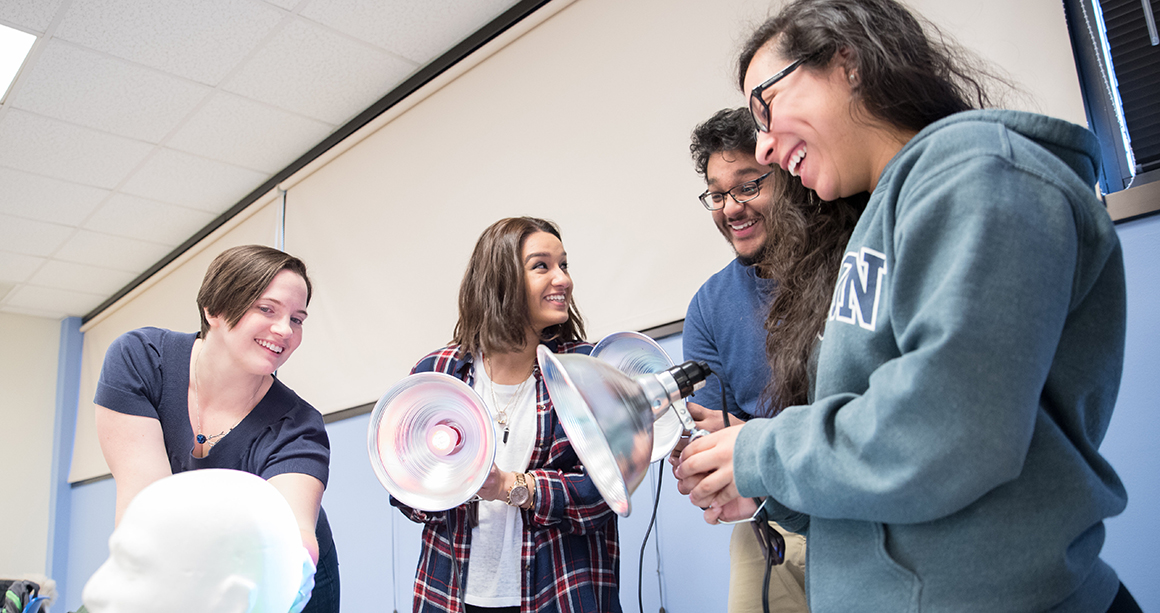
Studies in neuroscience combine coursework in psychology, biology, and chemistry to teach how the brain, body, and nervous system work. Students who pursue a neuroscience degree often go into medicine, academia, or research, including robotics and bioengineering.
Neuroscience is generally designed to provide rigorous preparation for advanced study in a PhD program. In addition to coursework in psychology and biology, you'll take required classes in physics and chemistry. Due to the interdisciplinary nature of the program, it's not unusual for some classes to be team-taught by biology and psychology professors in order to give each discipline their proper perspective.
The Student Experience
The neuroscience program builds quantitative, statistical, mathematical, and computational skills and hands-on laboratory experience. Professors focus on new techniques of learning, and themed labs help take traditional lecture courses and make them interactive and intuitive.
Students are encouraged to participate in internships. Examples include the Alzheimer's Association, the American Cancer Society, the Feinstein Institute for Medical Research, the National Alliance on Mental Illness, and the United Cerebral Palsy Association.

Program Overview

The BS in Neuroscience offers two tracks with a focus in psychology or biology, with courses that are selected from both departments. On the macro level, neuroscience examines things like stress and sleep. On the micro level, for example, it delves into how hormones and neurons affect the body.
Some classes and topics include behavioral neuroscience, biostatistics, sensation and perception, hormones and behavior, and clinical neuropsychology.
The Outlook
Neuroscience falls under the umbrella of medical science. According to the Occupational Outlook Handbook of the U.S. Bureau of Labor Statistics, this field is projected to grow 17% from 2020-2030, faster than average. The median annual wage for medical scientists was $91,510 in 2020.

Alumni outcomes
100% of recent alumni responding to a survey reported that they had either found employment or were attending or planning to pursue graduate studies.
Where our alumni are employed
100% of those students reporting employment responded that they had landed their positions either at or within six months of graduation. The mean reported salary within the first year following graduation was $38K. Examples of employers include:
- BioBehavioral Institute
- Boston University School of Medicine
- Central Nassau Guidance & Counseling Services, Inc.
- Credit One Bank
- Developmental Disabilities Institute, Inc.
- Huntington Learning Center
- Northwell Health
- Scribe America, Inc.
- Stanford University
- Walt Disney Company
Graduate studies
43% of these recent alumni reported they were attending or planning to attend graduate school. Examples where they are pursuing their advanced degrees include:
- Albert Einstein College of Medicine
- Boston University
- Columbia University
- New York University
- Rutgers University
- Silberman School of Social Work
- Syracuse University
- Teachers College, Columbia University
- University of Maryland, Baltimore County
- University of Miami
Sensation and Perception
“We think of the senses as these perfect mechanisms that will always give us the right answer, that our eyes will always make us see the right thing and that’s not true,” said Elisabeth Ploran, an associate professor of cognitive neuroscience and psychology. “Our brain plays tricks on us. In psychology, we’re usually focusing on perception and we think of that as the same as sensation. It’s important for students to understand the difference.”

Contact Us
Program Director
Keith M. Shafritz
Professor of Psychology
Hauser Hall 101
(516) 463-4856
Email
